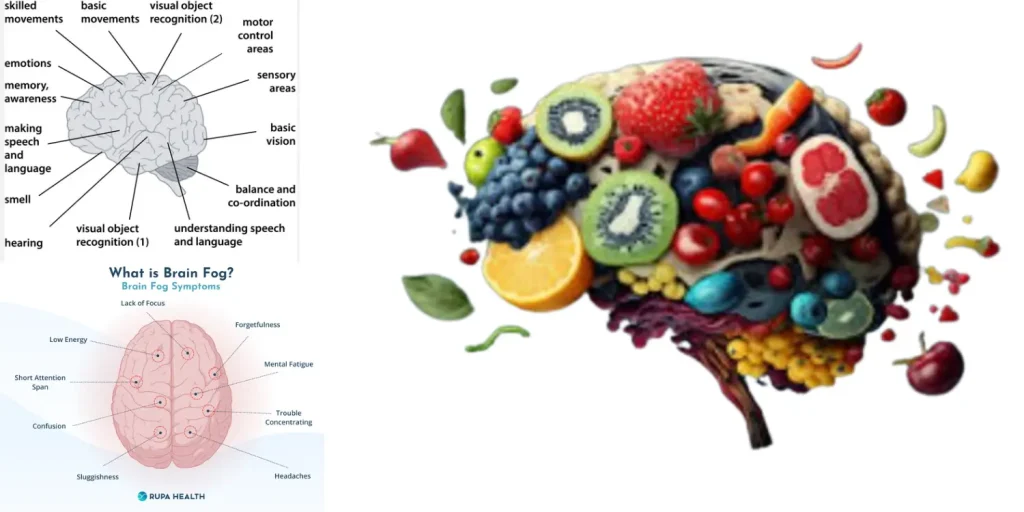Brain Fog: Most individuals complain of brain fog and this is described as a feeling of cognitive dysfunction. It is not a medical condition however it can really affect the day to day functioning and efficiency of the employee. This article had covered close common questions regarding brain fog and gives practical solutions concerning attention and focus.

What do we know about brain fog?
Some neuropsychiatric symptoms termed ‘cognitive fog’ include; slowed mental processing, memory impairment and difficulty in concentrating. Typical reasons include:
Lack of sleep: Lack of sleep reduces the brain capacity to function.
Anxiety and stress: Stress could lead to a deterioration of a person’s ability to think.
Nutritional Deficiencies: Lack of the very essential nutrient for growth such as the omega-3 fatty acid nutrient or vitamin B12.
Dehydration: Lack of water consumption affects brain operation.
Therefore, medical conditions include abnormalities in hormones, chronic fatigue syndrome, andautoimmune diseases.
Medication: The taken medications can produce negative impacts on cognitive skills.
Overuse of Technology: Screens depict a number of indicators that sooner or later can cause mental fatigue.

How does brain fog affect tasks in the daily life and productivity?
Fog in the brain can:
Decrease Efficiency: They take a long time to do because there is poor or lack of focus.
Memory Impairment: Forgetfulness may interrupt routine and obligation.
Boost Frustration: Stress arises from having attention-deficit disorder.
Reduced Energy: By mental tiredness, motivation and activity might be influenced.
Does food and hydration help get rid of brain fog?
In fact, one has to change the nutrition and hydration if he or she wants to reduce the intensity of brain fog.
Avoid foods that harm brain cells and instead take foods that benefit the brain, like berries, leafy greens, nuts and seeds, and fatty fish.
Keep Yourself Hydrated: Avoid alcohol or caffeine consumption and ensure that enough water is had each day.
Steer clear of processed foods: have reduced on the amount of refined carbs and sugar since such cause energy downs.
Think About Supplements: If deficiencies are seen, vitamins B12, D, and magnesium may be beneficial on clinical trials.

Exactly Which Exercises Aid the Enhancement of Mental Clarity?
This technique brings oxygen to the brain and helps to improve various cognitive aspects because of physical exertion.
Aerobic Exercises: Swimming, jogging, and walking help improve the oxygen supply in the brain department.
Most forms of yoga and meditation are effective for improving concentration and decreasing stress.
Strength exercise makes the clarity of the brain and overall well-being of an individual better.
Brain Exercises: Like any other part of the body, the brain also needs exercise, and learning new activities, playing memory games, and solving puzzles will take the brain through a workout session.

How Does Sleep Affect Concentration and Brain Fog?
Reduced number of hours spent on sleep is physicians’ choice for improved mental health.
Restoring Brain Function: Good sleep enhances memory and assists the body to detoxify.
Enhances mood: Adequate sleep relaxes one, and thus there will be little or no stress or irritation.
Enhances Focus: That is why sleep lengthens the span of attention and increases productivity.
To enhance the quality of your sleep:
Keep to your sleep schedule as often as possible.
It is specifically important that you avoid exposure to screens before going to sleep.
Switch to low light and minimal sound so that everyone is ready to go to sleep when they get into bed.

Does a Natural Cure Exist for Brain Fog?
Some of the signs of brain fog can be managed through natural remedies.
Herbal Teas: Ginseng and green tea enhance brain functioning.
Essential Oils: The use of peppermint and rosemary oils produces focus in people.
Mindfulness Techniques: Pranayama and meditation create a state of mind for physiology.
Sunlight Exposure: Taking regular sunshine has proven to improve both the levels of happiness and vitamin D.

Which diseases cause brain fog?
Brain fog is associated with a number of health problems:
Autoimmune diseases are diseases; they are conditions such as multiple sclerosis and lupus.
Chronic Fatigue Syndrome: it is as a result of this that fatigue is seen to have an effect on cognitive performance continuously.
Hormonal irritations are pregnancy, menopause, and thyroid disorder.
PTSD, sadness, and anxiety constitute mental health conditions.
Many of the signs that individuals experience when they have brain fog are improved by addressing the source of the problem.
Can stress be managed effectively to lessen brain fog?
However, stress reduction is needed and can significantly help people improve their overall conditions in life.
Take light exercise to help do away with stress, such as Tai Chi, yoga, or meditation.
Take Regular Breaks: One can do a lot to avoid burnout, especially while working, maybe by taking brief breaks.
Take Part in Hobbies: Stress can be brought down by leisure activities.
Socialize: Socialisation and contacting other people relieves pressure and stress levels.

What is the Participation of Technology Use in Cognitive Dysfunction?
Overuse of screens can:
can lead to eye strain, which in turn may produce headaches and also reduce concentration.
Disrupt Sleep: It is worth noting that the synthesis of melatonin may be adjusted with the help of blue light coming from the displays.
Overload the Brain: I couldn’t agree more with Frey, who asserts that notifications and multitasking increase mental fatigue.
To lessen the effects of digital fatigue:
If you need focused work, use the Pomodoro Technique.
Cut down on the time spent with phones, computers, and tablets at night.
Disable any unused alerts.
When should you see a doctor about brain fog?
See a medical professional if:
Symptoms are not relieved by changes in lifestyle.
Brain fog can really interfere with a person’s daily lifestyle.
The general symptoms include brain fog and other additional symptoms like pain, exhaustion, or mood swings.
A specialist can see what a layman cannot and recommend the most appropriate action to take.

Concluding remarks
Mental fog may be frustrating, though, as a rule, it can be effective to get over it in terms of a person’s changes in lifestyle. In order to help one remember simple things, one should ensure that they sleep, improve on their diet, and ensure that they take plenty of water, avoid stressing themselves, and avoid using their electronic gadgets. If a person experiences some of these signs continuously, they could possibly consult a doctor in an effort to find as well as address the root cause. The basic idea is that steady work can make you get a better quality of every day life and make your mind sharper.